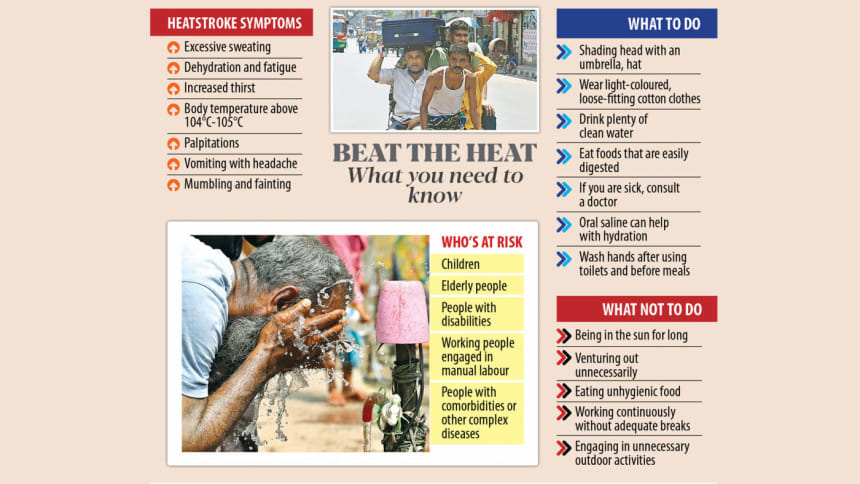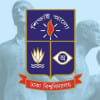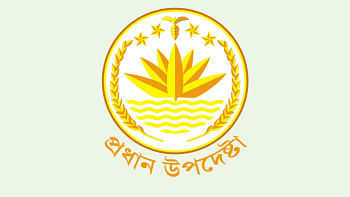Extreme heat sears the nation

The scorching heat continues to disrupt lives across the country, forcing the authorities to close down all schools and colleges till April 27.
According to the Met office, relief from this heatwave is not coming anytime soon.
Kazi Jebunnesa, a meteorologist at Bangladesh Meteorological Department, said, "This heatwave will persist throughout the month [April], and the temperature may further rise over the next few days."
On Thursday night, the Met issued a 72-hour nationwide heat alert, which was extended till April 22 yesterday evening.
At the beginning of this month, the heatwave began as "mild to moderate". Temperatures dropped slightly in different parts of the country on April 7 and 8 due to rains.
"When I get out of the house, it feels like someone is shooting fire at me. It's becoming really unbearable." -
However, the heatwave took a severe turn in many districts from April 15 onwards.
British daily The Guardian on April 4 reported that, according to climatologist and weather historian Maximiliano Herrera, a "historic heatwave" is being experienced across Southeast Asia.
In updates posted on X, a few days ago, Maximiliano said heat that was unprecedented for early April had been recorded at monitoring stations across the region this week.
Last month, the World Meteorological Organization said that even in February the region was "gripped by severe heat conditions" as temperatures frequently soared into the high 30s – well above the seasonal average.
It attributed the scorching weather to human-induced climate change, as well as the El Niño event, which brings hotter, drier conditions to the region.
An El Niño condition occurs when surface water in the equatorial Pacific becomes warmer than average and east winds blow weaker than normal.
In Bangladesh, schools and colleges were supposed to reopen today after the Eid and Pahela Baishakh holidays.
But the government yesterday decided that all primary and secondary schools, and colleges across the country will remain closed from April 21 to 27 due to the heatwave.
The primary and mass education ministry and the Directorate of Secondary and Higher Education announced the closures.
Also yesterday, the National University authorities directed all its affiliated colleges to keep the classes closed for an indefinite period.
NU Registrar Molla Mahfuz Al Hossain said, "Degree year-final exams slated for today will be held in line with the earlier routine. However, decisions about the rest of the exams will be taken later."
Meanwhile, different hospitals in the capital and elsewhere are seeing an increasing number of patients, especially those with diarrhoea, headache, sore throat, shortness of breath, and other issues as a direct impact of the ongoing severe heatwave.
Those who work outdoors – farmers, farmhands, rickshaw-pullers, traffic police and more – are the worst victims of this intense weather.
The intensity of the heat is making it difficult for people across the country to leave their homes. Compared to normal days, the number of people on the streets has been thinner.
Rezwan Ahmed, a jobholder, was waiting for rickshaw at the capital's Farmgate yesterday.
"When I get out of the house, it feels like someone is shooting fire at me. It's becoming really unbearable."
His wait was longer than usual as even the number of rickshaws was lower.
According to a Met notice yesterday, a very severe heatwave is sweeping over Jashore and Chuadanga, while a severe one is occurring in Dhaka division, other parts of Khulna division, and Rajshahi and Pabna districts.
A mild to moderate heat wave is occurring in Barishal division and the rest of Rajshahi division, along with Mymensingh, Moulvibazar, Feni, Cox's Bazar, Chandpur and Rangamati districts.
"Day and night temperatures may rise slightly across the country. Due to the increasing moisture incursion, the discomfort may worsen," it said.
The Met considers temperatures between 40-41.9 degrees Celsius as a "severe heatwave".
Meanwhile, the Supreme Court has relaxed its dress code for lawyers at the apex court due to the ongoing severe heatwave.
In a notification yesterday, it said the lawyers will not be required to wear black coats and gowns.
People from different districts, especially in Khulna and Rajshahi divisions, said their daily lives have been hampered due to the heatwave.
Yesterday, Jashore overtook Chuadanga with the highest temperatures in the country recorded at 42.6 degrees Celsius at 4:00pm. Over the last three days, Jashore has recorded temperatures above 40 degrees Celsius, according to the local meteorological office.
Chuadanga too continued to sizzle at 42.3 degrees Celsius at 3:00pm yesterday. This was the highest temperature in the district so far this year.
Rahman Mia, of Jashore, said he had gone out for eye tests but had to hurry back home due to the extreme heat. "I don't have words to explain the severity of the heat. Even a few minutes outside the house has become intolerable."
In Chuadanga, streets as well as crop fields were relatively empty.
Akhter Ali, a farmer of Keshabpur in Sadar upazila, said the number of farm workers has decreased compared to days with tolerable temperatures.
Day-labourer Jalal Uddin has resorted to changing his work timings. "I now go to work at dawn and come back by noon."
The Chuadanga district administration has been carrying out awareness campaigns to warn people about heat strokes.
In Rajshahi, working people were seen resting in shaded areas, while many rushed to street vendors for water or juice. Some chose to stay indoors.
Mohammad Khokon, a rickshaw-puller, had to stop by a water pump in Pathanpara area and pour water over his head to make things a little bearable while on duty.
Abul Kalam, another day-labourer, said, "I was so thirsty, I went to a vendor for coconut water. But it was too expensive. So, I opted for sugarcane juice."
Meanwhile, the Rajshahi City Corporation has been making loudspeaker announcements, advising people to stay indoors and drink enough water to avoid a heatstroke.
Three deaths, allegedly due to heatstroke, were reported in different media yesterday. However, when the Daily Star spoke to several doctors in the areas where the deaths occurred, they would not confirm the heat was to blame.

 For all latest news, follow The Daily Star's Google News channel.
For all latest news, follow The Daily Star's Google News channel. 








Comments